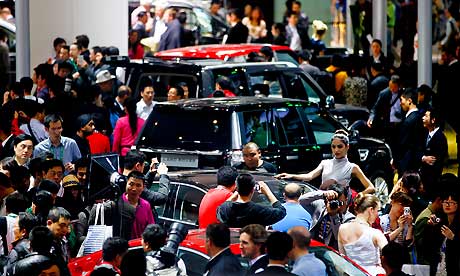
Jaguar Land Rover has moved to 24-hour production at its Merseyside factory to keep up with demand for the Evoque and Freelander, delivering more good news for Britain's car industry.
The carmaker, owned by Indian company Tata Motors, created a further 1,000 jobs at Halewood with the introduction of a night shift. It takes the factory's workforce to 4,500 – three times the number working there three years ago. They will work to a three-shift pattern, with the first night shift starting on Monday.
This will reduce the time customers have to wait for new models, such as the Range Rover Evoque and the Land Rover Freelander 2, which are made at the site. Nearly 90,000 Evoques have been sold since the car went into production in July 2011. The model, which has been marketed through a special edition designed in collaboration with Victoria Beckham, is particularly popular in China, where a new elite of entrepreneurs and other businesspeople snap up luxury cars.
More than 80% of the vehicles made at JLR's three UK factories are exported to China, Brazil and Russia.
More than 30,000 people applied for the 1,000 new jobs. Many of the new recruits have worked trial night shifts. JLR's human resources director, Des Thurlby, said: "These 1,000 new jobs are further evidence of JLR's clear ambition for continued growth. We are moving Halewood to three shifts and 24-hour operation to meet increased global demand for our products.
"JLR's supply chain is also set to benefit, with thousands more jobs expected to be created. Our commitment to expand the Halewood workforce and increase production is great news for JLR, for Merseyside and for the wider UK economy."When the move was first announced in March, business secretary Vince Cable said it was "further evidence of the strength of the UK automotive sector".
The carmaker is on course for record profits of about £1.5bn this year from strong demand in emerging markets, although the UK remains its biggest single market. It enjoyed a 45% boom in second-quarter profits worth more than £500m, on a 91% increase in sales to China, it reported last week.
Ralf Speth, the chief executive of JLR, said at the time: "We have a very low market share in China… therefore we are sure we can continue this growth."
JLR overall sales during the second quarter were 83,452 vehicles, up 34%. That included nearly 72,000 Land Rovers – but fewer than 12,000 Jaguar saloon cars.
Tata bought Jaguar Land Rover from the Ford Motor Company in 2008 for about £1.5bn. After JLR's comeback from years of struggling the carmaker now employs 24,000 people in Britain. About 8,000 were taken on in the past two years, even before the Halewood move.
The company also wants to build a new engine plant in south Staffordshire that could hire a further 750 workers. JLR has said it will also manufacture a new Jaguar F-type at the Castle Bromwich site in Birmingham.
JLR is one of several automobile success stories in Britain with Japanese carmakers Toyota, Nissan and the BMW-owned Mini business also investing in their UK factories to expand production.

